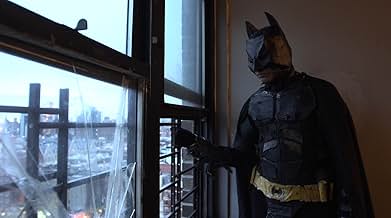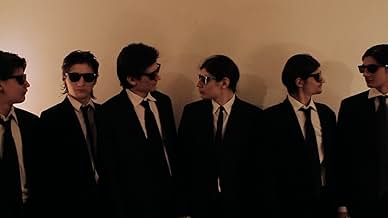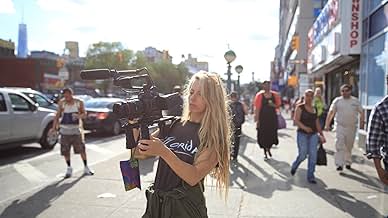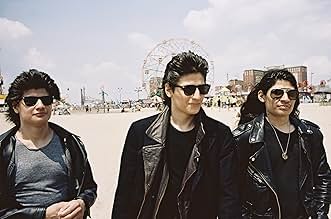IMDb रेटिंग
7.0/10
14 हज़ार
आपकी रेटिंग
अपनी भाषा में प्लॉट जोड़ेंConfined in an apartment from a New York housing project, the six Angulo brothers learned everything they know about the world through watching films and spend their time reenacting their fa... सभी पढ़ेंConfined in an apartment from a New York housing project, the six Angulo brothers learned everything they know about the world through watching films and spend their time reenacting their favorite movies with intricate homemade costumes.Confined in an apartment from a New York housing project, the six Angulo brothers learned everything they know about the world through watching films and spend their time reenacting their favorite movies with intricate homemade costumes.
- पुरस्कार
- 7 जीत और कुल 15 नामांकन
Christian Bale
- Self
- (आर्काइव फ़ूटेज)
- (बिना क्रेडिट के)
Amanda Plummer
- Self
- (आर्काइव फ़ूटेज)
- (बिना क्रेडिट के)
Isabella Rossellini
- Self
- (आर्काइव फ़ूटेज)
- (बिना क्रेडिट के)
फ़ीचर्ड समीक्षाएं
I thought this documentary was a mess. Sketches of information were given to us and left up to the viewer to fill in the blanks. First and foremost, what is going on with the parents? We know that the father is abusive toward the mother and has kept her virtually locked away from her family and society. Okay, we get that. But then it shows a scene of her out jogging. Hello! Would you care to elaborate on why this woman who has been abused for 20 years is out exercising? Why did she decide to call her mother after all these years? If she is going outdoors now, too then does she plan on leaving him? Does she realize how sick her husband is? Well, we don't know what she thinks because it appears the film maker never asked her.
The father, who is the central character here, is shown as a lazy drunk who either is paranoid or uses his distrust of society as a reason to sit at home all day and drink. Why doesn't the filmmaker get him to talk so we can figure out if he's a leach or mentally ill? Does he abuse his kids, too? If he kept his kids inside all those years, he doesn't seem too upset that they're going out. And wait.....is that him and his wife walking hand and hand through a park together? If you find the 20/20 story somewhere then I recommend watching that instead of this. You'll come away with twice the understanding in half the time.
The father, who is the central character here, is shown as a lazy drunk who either is paranoid or uses his distrust of society as a reason to sit at home all day and drink. Why doesn't the filmmaker get him to talk so we can figure out if he's a leach or mentally ill? Does he abuse his kids, too? If he kept his kids inside all those years, he doesn't seem too upset that they're going out. And wait.....is that him and his wife walking hand and hand through a park together? If you find the 20/20 story somewhere then I recommend watching that instead of this. You'll come away with twice the understanding in half the time.
In Wolfpack, winner of the Sundance Grand Jury Award (2015), the Angulo family is indeed alone and secluded from its environment. Secluded in their Lower Eastside of Manhattan apartment, the 6 children have rarely gone outside because father deems New York too dangerous. That's not the exceptional part of this odd-ball documentary.
The WOW factor is that the kids have grown up relatively unscathed by their isolation. Their saving grace has been their movie addiction, wherein they re-enact scenes from famous films such as Reservoir Dogs and The Dark Knight. Although we don't actually see them filming, we do watch them create ingenious costumes and devise tableaux to emphasize the drama, albeit fictional, found outside their cramped world. As in the recent Me and Earl and the Dying Girl, young people are turning to movies for their societal awareness and outlet for their creative impulses. It could be much worse.
That's all there is, Folks. First-time helmer Crystal Moselle doesn't allow much more depth, for instance on what makes their strong but not particularly articulate father, who gave his children Sanskrit names, do the things he does like imprisoning his kids to avoid their ruin from the streets of New York. Or why mom has been mostly withdrawn yet loving. However as in Grey Gardens, we are privileged observers without restraint, a virtue in documentary film making.
It's just that beyond the cardboard box Batman costumes and impressive toy guns, not much else happens. Perhaps it's the Seinfeld "about nothing" motif but only without Jerry's wit.
The WOW factor is that the kids have grown up relatively unscathed by their isolation. Their saving grace has been their movie addiction, wherein they re-enact scenes from famous films such as Reservoir Dogs and The Dark Knight. Although we don't actually see them filming, we do watch them create ingenious costumes and devise tableaux to emphasize the drama, albeit fictional, found outside their cramped world. As in the recent Me and Earl and the Dying Girl, young people are turning to movies for their societal awareness and outlet for their creative impulses. It could be much worse.
That's all there is, Folks. First-time helmer Crystal Moselle doesn't allow much more depth, for instance on what makes their strong but not particularly articulate father, who gave his children Sanskrit names, do the things he does like imprisoning his kids to avoid their ruin from the streets of New York. Or why mom has been mostly withdrawn yet loving. However as in Grey Gardens, we are privileged observers without restraint, a virtue in documentary film making.
It's just that beyond the cardboard box Batman costumes and impressive toy guns, not much else happens. Perhaps it's the Seinfeld "about nothing" motif but only without Jerry's wit.
I enjoyed this.
I thought the nature of the family and the back story made the audience easily interested.the cuts to video footage of cinema footage and the boys leaving the apartment was an absolute winner.
While we don't get a full back story on the dad and his impact its impact is evident through the boys interaction with him. His dis like of or non acceptance is pretty evident by the way he acts when the boys finally go on a road trip. I liked it, great footage, easy to like the rogue characters and enough left unexplained to make it a good film overall
I thought the nature of the family and the back story made the audience easily interested.the cuts to video footage of cinema footage and the boys leaving the apartment was an absolute winner.
While we don't get a full back story on the dad and his impact its impact is evident through the boys interaction with him. His dis like of or non acceptance is pretty evident by the way he acts when the boys finally go on a road trip. I liked it, great footage, easy to like the rogue characters and enough left unexplained to make it a good film overall
Greetings again from the darkness - from the Dallas International Film Festival. In what is one of the oddest real life stories I have ever seen, director Crystal Moselle takes her camera inside the Lower East Side apartment of the Angulo family – 6 brothers, one sister, and their parents. In their spare time, the kids re-enact movies within the apartment using elaborate costumes, sets and props. And no, that's not the odd part.
Despite being mostly teenagers, these siblings have only left their apartment a few times in their life – a very few times maybe once or twice a year, and not at all one year. They have been home schooled by their mother and are quite charming and articulate, despite the quasi-prison environment. The kids are not abused in the physical sense, but an argument can be made that mental anguish is in play here.
Their movie scenes are fun to watch, especially given their Tarantino leanings with Reservoir Dogs and Pulp Fiction. Ms. Moselle manages to capture a significant amount within the confines of the apartment. Her interviews with the boys are enlightening, but it's the mother that provides the most context. Her regrets and dashed dreams for her kids cause her much pain, and it's quite clear that the dad has some type of psychological vice grip on the family. The dad raises some eyebrows when he states "My power is influencing people". As viewers, we don't see this, but there is physical proof to his claim.
With no shortage of powerful moments, there are still two that jump off the screen. The first occurs as the boys head out on their own to watch their first movie in a real theatre, and then have such a fan boy moment after watching The Fighter. The second involves the mom having a conversation with her mother after not speaking for more than two decades. It's an emotional moment.
We can't help but like the boys and pull for them to find some normalcy outside the walls of the apartment. Their final film project needs no additional commentary as the lead character watches various emotions travel past his window fitting since a NYC apartment window provided this family its only glances at the real world for so many years.
Despite being mostly teenagers, these siblings have only left their apartment a few times in their life – a very few times maybe once or twice a year, and not at all one year. They have been home schooled by their mother and are quite charming and articulate, despite the quasi-prison environment. The kids are not abused in the physical sense, but an argument can be made that mental anguish is in play here.
Their movie scenes are fun to watch, especially given their Tarantino leanings with Reservoir Dogs and Pulp Fiction. Ms. Moselle manages to capture a significant amount within the confines of the apartment. Her interviews with the boys are enlightening, but it's the mother that provides the most context. Her regrets and dashed dreams for her kids cause her much pain, and it's quite clear that the dad has some type of psychological vice grip on the family. The dad raises some eyebrows when he states "My power is influencing people". As viewers, we don't see this, but there is physical proof to his claim.
With no shortage of powerful moments, there are still two that jump off the screen. The first occurs as the boys head out on their own to watch their first movie in a real theatre, and then have such a fan boy moment after watching The Fighter. The second involves the mom having a conversation with her mother after not speaking for more than two decades. It's an emotional moment.
We can't help but like the boys and pull for them to find some normalcy outside the walls of the apartment. Their final film project needs no additional commentary as the lead character watches various emotions travel past his window fitting since a NYC apartment window provided this family its only glances at the real world for so many years.
The six Angulo boys, their sister and their mother live in a low-income New York City apartment with their father, Oscar Angulo, who won't let them go outside. Well, some years they get to leave their apartment and some years they don't. They are home schooled, which in the case of these kids, means watching movies all day, transcribing the scripts and then filming their own versions. These feral, Peruvian John Travolta looking teenagers have probably seen Pulp Fiction fifty times, though they most certainly prefer Reservoir Dogs. Normality, to them, is film. The world they find in film is inspiring, and, coupled with the natural tendency of the captured to escape, they break out, running down the streets of Manhattan, only to be chased down by budding documentary filmmaker, Crystal Moselle. The film begins there. Although the documentary disregards some major questions around the reasons for entrapment and isolation, the boys are fascinating and their impact is lasting. This film inspires the big dreamers; those who are looking to break their shackles.
क्या आपको पता है
- ट्रिवियाThis film was partially supported by the Adrienne Shelly Foundation, a nonprofit organization that awards grants to female actors, writers, and/or directors of short films, feature films, and documentaries. The foundation was created by Andy Ostroy, the widower of actress, writer, and director Adrienne Shelly, after Shelly was murdered in 2006 at the age of 40.
- क्रेज़ी क्रेडिटAfter the ending credits have rolled, a wolf howls
- साउंडट्रैकThis Is Halloween
Written by Danny Elfman
Performed by The Citizens of Halloween Town
Published by Buena Vista Music Company
Courtesy of Walt Disney Records
टॉप पसंद
रेटिंग देने के लिए साइन-इन करें और वैयक्तिकृत सुझावों के लिए वॉचलिस्ट करें
- How long is The Wolfpack?Alexa द्वारा संचालित
विवरण
बॉक्स ऑफ़िस
- US और कनाडा में सकल
- $13,01,696
- US और कनाडा में पहले सप्ताह में कुल कमाई
- $43,920
- 14 जून 2015
- दुनिया भर में सकल
- $14,14,140
इस पेज में योगदान दें
किसी बदलाव का सुझाव दें या अनुपलब्ध कॉन्टेंट जोड़ें































